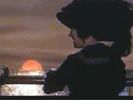Eye For Film >> Movies >> And The Ship Sails On (1983) Film Review
A luxury ocean liner embarks on a voyage to the island of Erimo, carrying various aristocrats, composers, opera singers and performers as they take the ashes of famed soprano Edmea Tetua to be scattered at the place of her birth. However, Fellini's E la nave va (And The Ship Sails On) is less concerned with the destination and more with the journey. Initially, moving at a slow pace, the tone shifts noticeably with the arrival on board of a group of Serbian refugees, fleeing from their homeland on the eve of World War I.
We are introduced to this menagerie of the rich and the very rich by Orlando (Freddie Jones), a journalist who, like us, looks in from the outside, and acts as a narrator throughout. He wanders the ship with a cameraman, attempting to interview the passengers, but more often than not, merely observing their behaviour. The first half of the film contains some glorious set pieces, in particular a wonderful wine glass concerto played out in the galley and an impromptu performance in the ship's boiler room, as each opera singer competes in turn to impress the workers below with the range of his, or her, voice.

Perhaps the strongest focus of the film is on the absurdity of the upper classes and their ignorance of what is happening in the world. This is reflected no better than in Orlando's interview with the Austrian Grand Duke. Communicating through a translator, a series of comic exchanges means that by the end of the interview neither party has a better idea of what the other was saying than when they started.
The rescuing of the Serbian refugees on the third night seems the perfect opportunity for a social commentary on the class divides, but such juxtaposition is rarely offered easily. One of the few exceptions is when the Serbs huddle outside the dining room, peering through the windows as the elite dine to excess, which is followed by an unexpected gathering of the two groups on deck. As both mix freely amongst an atmosphere of music and dance, this is possibly the first indication that all on board are now aware that everything is about to change. Indeed, as the ship sails on, carrying the last remnants of this bygone era of luxury and extravagance, the film's final scenes become all the more poignant.
From the brilliant opening, filmed in the style of an old silent movie, gradually blending in sound and colour, as the passengers board the ship, to the grand operatic finale off the island, E la nave va is a pure visual treat. The experience is heightened further by the musical accompaniments, particular the opera pieces from Verdi's La forza del destino, Rigoletto and Aida, but also Fellini's choreography of these scenes; the actors moving perfectly in time to the music.
While it is fair to say that the film lacks a substantial plot, or depth to any of its characters, Fellini's visual imagination and creativity remain a sight to behold.
Reviewed on: 18 May 2006




















